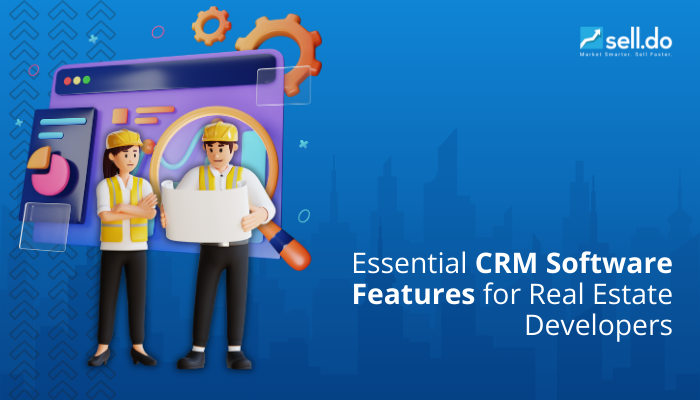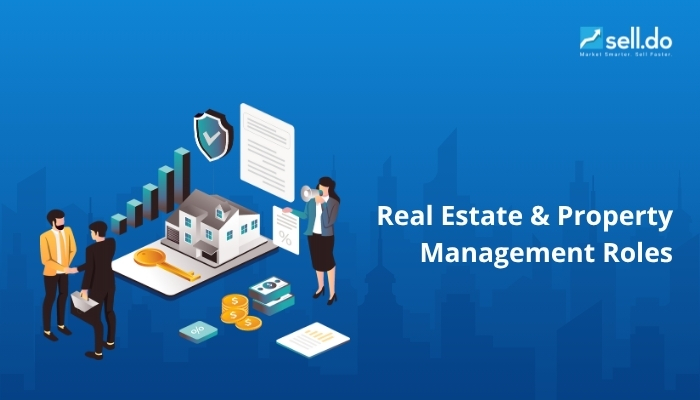Managing real estate projects without the right tools is like building a house without a blueprint. Without clear direction, you risk delays, confusion, and costly mistakes. A real estate CRM gives you a structure by organizing client data and streamlining processes.
A tool with robust real estate CRM software features can become a central hub, allowing you to view and move every aspect of your business together harmoniously. Instead of juggling scattered spreadsheets, endless emails, and client follow-ups, a CRM brings order to the chaos. It allows you to manage leads, track customer interactions, and oversee projects from start to finish, helping you stay on top of your game and focus on what truly matters—delivering top-notch service and closing deals.
As the global real estate market is projected to reach $729.40 trillion by 2028, a CRM is essential for tracking leads and gaining business insights to stay competitive.
Ready to know more? Let’s dive in!
What is Real estate CRM Software?
Real estate CRM software is a specialized tool designed to help developers and agents manage client relationships, track deals, and streamline operations from a single platform. With a CRM, you can store data in the cloud to ensure easy access to information, whether you’re in the office or on the move.
Real estate CRM features range from capturing leads to automating marketing and managing listings, quickly turning prospects into clients. It can become your digital assistant, organizing client interactions and simplifying complex tasks so you can focus on delivering exceptional service and closing deals faster.

Using Marketing Automation in Real Estate to Close More Deals
10 Key Real Estate CRM Software Features To Look For

With countless real estate CRM options on the market, finding the perfect one for your business can feel overwhelming. Thus, it is essential to focus on the features of real estate software that matter the most. Here are ten key features to consider when choosing the right real estate CRM.
-
Leads Capture and Automation
Lead management is a crucial real estate CRM software feature that ensures your business captures, tracks, and nurtures leads effectively. The real estate industry employs various methods to attract potential customers, such as social media, websites, or advertisements. However, without a robust system in place, managing these leads can become a hassle.
An effective CRM automates collecting leads from various sources but also connects these leads with appropriate properties, simplifying your sales procedure. A CRM with advanced lead management tools enables your team to categorize and prioritize leads using criteria like client interest or property type. Additionally, it can conduct simple prospecting, recognizing potential buyers interested in purchasing a property shortly. The CRM can help you with the following:
- Track client activities and share valuable insights with agents for informed outreach.
- Match leads to properties quickly, making it easier to schedule viewings.
- Segment and prioritize leads to focus on high-value opportunities.
- Generate lists of active buyers for targeted marketing of new listings.
-
Transaction Management
The real estate CRM software should include a transaction management feature to streamline the buying and selling process. From collecting and organizing property details to managing contracts and closing documents, a CRM should help you handle every step efficiently. It should have these capabilities:
- Centralizes all property and transaction information in one place.
- Creates and tracks task checklists to stay organized and on schedule.
- Upload and share important documents with your team and clients.
- Automates reminders for key deadlines and contract milestones.
-
Sales Pipeline Management
 A robust CRM should offer robust pipeline management as one of its essential real estate CRM software features to help agents track and close deals effectively. With multiple clients and varying stages in the sales process, you might lose track of important interactions and deadlines.
A robust CRM should offer robust pipeline management as one of its essential real estate CRM software features to help agents track and close deals effectively. With multiple clients and varying stages in the sales process, you might lose track of important interactions and deadlines.
A CRM with strong pipeline management capabilities can help with the following:
- Visualize your entire sales process to track leads at each stage.
- Automate follow-up reminders to stay on top of client interactions.
- Identify and prioritize high-value opportunities to focus your efforts.
- Monitor key metrics like deal value and closing probability for better forecasting.
 Recommended read:
Recommended read:
-
Document Management

Documentation management is an essential real estate CRM software feature that helps streamline the constant influx of titles, contracts, loan agreements, and other critical paperwork. Manually managing this volume of paperwork can be overwhelming and lead to costly errors or legal disputes. A CRM with integrated documentation management ensures that all files are securely stored, easily processed, and accessible when needed, allowing agents to stay organized and compliant. The platform can help you with the following:
- Securely store and organize essential real estate documents in one place.
- Integrate with document signing tools like DocuSign for efficient processing.
- Set user permissions to control access and maintain confidentiality.
- Easily tag and distribute documents to ensure smooth collaboration within your team.
-
Marketing Automation
Marketing automation is another must-have real estate CRM software feature to streamline marketing efforts. Instead of manually managing every email, social media post, or campaign, a CRM with marketing automation allows you to schedule, personalize, and trigger actions based on client interactions. These tools save time by automating the following:
- Automating email campaigns and social media posts for consistent engagement.
- Tracking customer behavior and automatically triggering relevant actions.
- Personalizing content for specific audience segments without manual effort.
- Using data-driven insights to refine your strategy and improve ROI.
-
Client Interaction Automation

Having well-maintained records of client engagements is vital for real estate success, and a CRM guarantees you stay on top of everything. It helps centralize all communication on a single platform so you can effectively track, arrange meetings, and send prompt messages to advance leads. A CRM can help you build stronger relations with your customers with the following features:
- Consolidate and structure all client correspondences in a single location.
- Automate follow-up and reminder tasks for smooth communication.
- Easily arrange meetings using integrated tools.
- Ensure that potential customers stay interested and progress through the sales pipeline by using customized communication.
-
Reporting and Analytics
Reporting and analytics are crucial real estate CRM software features that provide valuable insights into your sales and marketing efforts. Instead of manually compiling data, a CRM allows you to generate customized reports that track key performance indicators and metrics.
You can filter, group, and sort reports according to your needs, giving you a clear overview of your team's activities, lead conversion rates, and overall sales performance. With real-time dashboards, you can instantly see what’s working and where to improve, helping you make data-driven decisions and hit your targets more efficiently. Typically, a CRM offers the following features to help you oversee and optimize your workflow:
- Generate custom reports tailored to your business needs.
- Track real-time metrics through reporting dashboards.
- Analyze sales activity and performance to optimize strategies.
- Save and organize reports for easy access and future reference.
-
Integration Capabilities
Integration capabilities are crucial for a real estate CRM. They allow seamless connection with other essential tools like marketing platforms or document management systems. A CRM with strong integration ensures that all your software works together, improving efficiency and reducing manual data entry. Consider the following points when selecting a CRM:
- Look for CRMs with open APIs for easy app integration.
- Ensure compatibility with key tools like email marketing and document signing platforms.
-
Mobile Apps
In real estate, mobility is essential because you’re constantly moving— meeting clients, visiting properties, or attending viewings. Thus, you need a CRM that is accessible from anywhere to keep up with the workflow.
A cloud-based CRM with both desktop and mobile access lets you manage your business from any location, ensuring you can handle tasks in real time, update client information, and track deals even while out of the office. Plus, it keeps your data secure, so you can work confidently, knowing everything is protected and easily accessible.
- Choose a CRM with mobile access for real-time updates.
- Ensure it has robust security features to protect sensitive data.
-
Scalability
Choose a system that grows with your business, ensuring you won't need to switch tools or migrate data as your team expands.
- Opt for a CRM that can handle your agency’s future growth.
- Ensure it supports easy data management as your needs evolve.
With the right CRM, you can capture potential leads and grow your business effectively. And this is where Sell.Do comes in!
 If you’re struggling with lead generation, explore our blog:
If you’re struggling with lead generation, explore our blog:Strategies for Real Estate Lead Generation in 2024 to boost your business!
Meet Sell.Do, The Best Real Estate CRM

Sell.Do is the best CRM solution that offers all the real estate CRM software features you’re looking for! With over ten years of industry expertise and a proven track record of managing 450 million customer interactions, Sell.Do is India’s only end-to-end CRM for real estate professionals.
It addresses real estate's unique challenges by automating key processes, enhancing communication, and delivering valuable insights. This helps you focus more on clients and less on administrative tasks.
Key Features
- Marketing Automation: Streamlines repetitive tasks, allowing real estate agents to focus on clients while automating campaigns and workflows.
- Pre-sales Management: Tracks prospects, organizes data, and provides insights to optimize follow-ups and lead engagement.
- Sales Management: Offers performance tracking and data-driven insights to guide decisions and improve team efficiency.
- Channel Partner Management: Enhances collaboration with channel partners, improving visibility and sales productivity.
- Post-Sales Management: Simplifies the post-sales process with task automation, document storage, and seamless deal management.
Your search for a comprehensive platform with all the real estate CRM software features ends here! Sell.Do is adept at helping you streamline tasks, from inventory management to lead generation and marketing efforts - it can do everything efficiently.

Top Real Estate CRM Mistakes You Need to Avoid to ensure you choose the right tool!
Final Thoughts
Familiarizing yourself with real estate CRM software features is essential to finding the perfect tool for your business. Evaluate your business needs first to understand which features would be beneficial.
Additionally, if you don’t want the hassle of managing multiple tools and need a dedicated platform designed explicitly for the real estate industry, we recommend using Sell.Do. With advanced automation tools, seamless integration, and the ability to set up a customized sales process, Sell.Do enables real estate teams to stay organized, maximize leads, and close more deals efficiently.
Request a demo now to learn more!






Leave a comment
Comments (0)
Be the first one to comment.